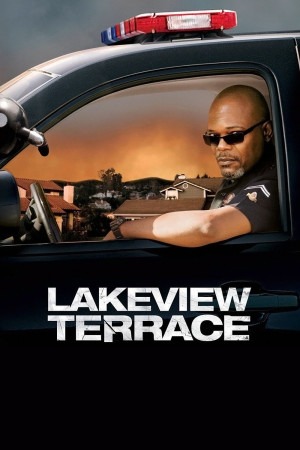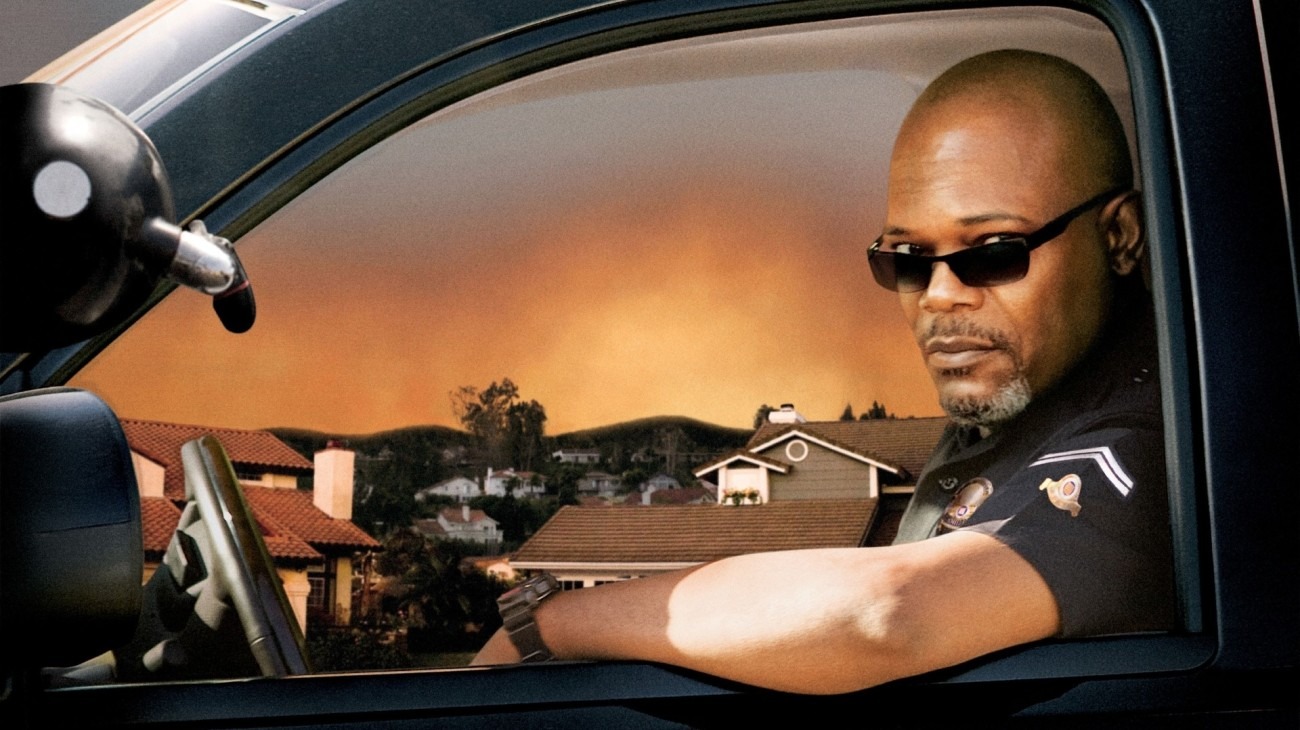
The thin blue line
Man, remember when a Neil LaBute film meant something? Not always something good, but that was all part of the point. You take your In the Company of Men, for example, which really was an outrageous firebomb in the indie film world of 1997, inciting arguments both for and against its rampaging misanthropy and misogyny, and dammit if the film didn't support both sides. That's what a properly controversial film looks like, and eleven years later there's still nothing at all like a consensus, though as LaBute's fortunes have waned, defending even his earliest work has become much less appealing (for myself, I view his debut as being one of the very few geniunely great films to emerge from that laboratory of mediocrity known as the Sundance Film Festival)
Anyway, with his third feature, Nurse Betty, the director took an unexpected turn into goofy, violent comedy, and his career never really got back to that first flush of dangerous misanthropy. Possession was nothing but a middling literary thriller, The Shape of Things felt more like a LaBute parody than the real thing, and the less said about his incomprehensibly bad remake of The Wicker Man, the better. Viewed all in a line, the basic thrust of the director's career has unmistakably been one towards being a Hollywood hack, abandoning his early provocations as soon as the big money studio assignments came rolling in, and this brings us by a commodius vicus of recirculation to Lakeview Terrace, a glossy "bad cop" thriller that achieves only a banal, surface-level recreation of LaBute's old cage-rattling proclivities, while deliberately burying the director's presence so deeply that his name isn't even being used in the advertisements (just as well; he didn't even write the screenplay, which is instead by David Loughery and Howard Korder).
The desired controversy this time 'round is racism, as revealed in the turf war between two suburban Angelinos. Abel Turner (Samuel L. Jackson) is an African-American LAPD officer, widowed with two children, whose life is dedicated to the establishment and enforcement of Rules and Order, and who disdains any and all liberal ideas that drift his way. This comes to be a problem when he gets a new pair of neighbors, the mixed-race Mattsons: Chris (Patrick Wilson) and Lisa (Kerry Washington). For his part, Chris is already used to hearing elderly black men declaiming how inappropriate it is for the races to thus intermingle, thanks to his father-in-law Harold (Ron Glass), but he and his wife are ill-prepared for the ferocity with which Abel attacks their domestic bliss, and his authoritarian fear that their "permissive" lifestyle will rub off on his kids. Cue an increasingly nightmarish hell for the young couple as Abel shines lights into their bedroom all night, destroys their air conditioner, slashes their tires, etc. etc. Meanwhile, très metaphorical wildfires slowly creep towards the placid Lakeview neighborhood where this melodrama plays out.
I think it's supposed to go like this: first we are stunned by the casual racism that a black man can espouse towards a harmless interracial marriage - A black racist! What will they think of next? - then we are rankled by the film's own obvious racism, and finally made to understand that racism is a tricky issue in modern America (incidentally, I can't imagine that the intended audience for this film comes in any hue other than lily-white). And perhaps that neat little three-step program would have even worked, if Lakeview Terrace were actually so aggressive that it could actually piss anybody off. But no, 'tis not to be; much like Crash, the touchstone for all Los Angeles-based stories of American racism, this movie is far too obvious to feel like anything but a lecture. Everything that we're supposed to mull over and find insightful, angering, or both, is conveyed in leaden plot developments that declare their pedagogic role with a crushing lack of imagination. It's very much like the feeling you get in those "book club" editions of novels that have suggested topics for discussion on the back pages:
-Chris makes a statement comparing his father-in-law with Abel, which Lisa describes as racist. Is Chris suggesting that all older black men are the same, or does he mean to imply some other relationship between the two men?
-Abel says that white people say "whatever" as a way of shutting down conversation so they can go do what they wish. Is this what Chris meant when he says "whatever", and how does this reflect on his race?
And so forth. It doesn't help that Lakeview Terrace suffers from a tremendously routine plot arc (milquetoast husband learns that he must assert himself physically to save his family and homestead), and that all of the plot beats have the inevitability of kabuki. They just lie there barefaced, gleaming in all their unlovely obviousness, until the next thudding BEAT of narrative advance pushes them out of the way (the late explanation of what happened to Abel's wife, and why he happens to be such a damned racist, is a particular howler both in its clichéd nature and in how little it actually explains). Thus it plods along, drifting occasionally into ugly sexism that passes by unremarked, and sets up a weird contradiction in tone that never resolves itself as the film fades out (so is Lisa a schemer, or a swell lady? Because it would be too much for the film that she can be both).
Nor does LaBute, never much of a formal adventurer, do much to finesse the story into something fleet and interesting. Save for a few nice landscape shots that were probably filmed by a second unit anyway, Lakeview Terrace tries to coast along on its shocking offensiveness that is neither shocking nor offensive, just kind of bland and boring, and the whole thing is pretty much as disposable as any project featuring Samuel L. Jackson as a violent cop could conceivable be.
5/10
Anyway, with his third feature, Nurse Betty, the director took an unexpected turn into goofy, violent comedy, and his career never really got back to that first flush of dangerous misanthropy. Possession was nothing but a middling literary thriller, The Shape of Things felt more like a LaBute parody than the real thing, and the less said about his incomprehensibly bad remake of The Wicker Man, the better. Viewed all in a line, the basic thrust of the director's career has unmistakably been one towards being a Hollywood hack, abandoning his early provocations as soon as the big money studio assignments came rolling in, and this brings us by a commodius vicus of recirculation to Lakeview Terrace, a glossy "bad cop" thriller that achieves only a banal, surface-level recreation of LaBute's old cage-rattling proclivities, while deliberately burying the director's presence so deeply that his name isn't even being used in the advertisements (just as well; he didn't even write the screenplay, which is instead by David Loughery and Howard Korder).
The desired controversy this time 'round is racism, as revealed in the turf war between two suburban Angelinos. Abel Turner (Samuel L. Jackson) is an African-American LAPD officer, widowed with two children, whose life is dedicated to the establishment and enforcement of Rules and Order, and who disdains any and all liberal ideas that drift his way. This comes to be a problem when he gets a new pair of neighbors, the mixed-race Mattsons: Chris (Patrick Wilson) and Lisa (Kerry Washington). For his part, Chris is already used to hearing elderly black men declaiming how inappropriate it is for the races to thus intermingle, thanks to his father-in-law Harold (Ron Glass), but he and his wife are ill-prepared for the ferocity with which Abel attacks their domestic bliss, and his authoritarian fear that their "permissive" lifestyle will rub off on his kids. Cue an increasingly nightmarish hell for the young couple as Abel shines lights into their bedroom all night, destroys their air conditioner, slashes their tires, etc. etc. Meanwhile, très metaphorical wildfires slowly creep towards the placid Lakeview neighborhood where this melodrama plays out.
I think it's supposed to go like this: first we are stunned by the casual racism that a black man can espouse towards a harmless interracial marriage - A black racist! What will they think of next? - then we are rankled by the film's own obvious racism, and finally made to understand that racism is a tricky issue in modern America (incidentally, I can't imagine that the intended audience for this film comes in any hue other than lily-white). And perhaps that neat little three-step program would have even worked, if Lakeview Terrace were actually so aggressive that it could actually piss anybody off. But no, 'tis not to be; much like Crash, the touchstone for all Los Angeles-based stories of American racism, this movie is far too obvious to feel like anything but a lecture. Everything that we're supposed to mull over and find insightful, angering, or both, is conveyed in leaden plot developments that declare their pedagogic role with a crushing lack of imagination. It's very much like the feeling you get in those "book club" editions of novels that have suggested topics for discussion on the back pages:
-Chris makes a statement comparing his father-in-law with Abel, which Lisa describes as racist. Is Chris suggesting that all older black men are the same, or does he mean to imply some other relationship between the two men?
-Abel says that white people say "whatever" as a way of shutting down conversation so they can go do what they wish. Is this what Chris meant when he says "whatever", and how does this reflect on his race?
And so forth. It doesn't help that Lakeview Terrace suffers from a tremendously routine plot arc (milquetoast husband learns that he must assert himself physically to save his family and homestead), and that all of the plot beats have the inevitability of kabuki. They just lie there barefaced, gleaming in all their unlovely obviousness, until the next thudding BEAT of narrative advance pushes them out of the way (the late explanation of what happened to Abel's wife, and why he happens to be such a damned racist, is a particular howler both in its clichéd nature and in how little it actually explains). Thus it plods along, drifting occasionally into ugly sexism that passes by unremarked, and sets up a weird contradiction in tone that never resolves itself as the film fades out (so is Lisa a schemer, or a swell lady? Because it would be too much for the film that she can be both).
Nor does LaBute, never much of a formal adventurer, do much to finesse the story into something fleet and interesting. Save for a few nice landscape shots that were probably filmed by a second unit anyway, Lakeview Terrace tries to coast along on its shocking offensiveness that is neither shocking nor offensive, just kind of bland and boring, and the whole thing is pretty much as disposable as any project featuring Samuel L. Jackson as a violent cop could conceivable be.
5/10
Categories: joyless mediocrity, thrillers






